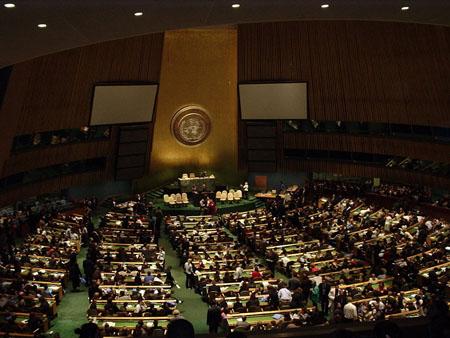The United Nations Human Rights Council adopted a motion on June 20 that directs the UN High Commissioner to launch a study of how gay, bisexual and trans people are discriminated against across the world.
“The Council requests the High Commissioner to commission a study to be finalized by December 2011 to document discriminatory laws and practices and acts of violence against individuals based on their sexual orientation and gender identity, in all regions of the world, and how international human rights law can be used to end violence and related human rights violations based on sexual orientation and gender identity,” the declaration reads.
Read the complete text of the resolution for yourself here. A panel to discuss the results will be convened in the 19th session of the Council.
The vote on the study was 23 to 19, with three abstentions. The United States, the UK and several Scandinavian countries voted in favour of the resolution, while Russia, Nigeria, Uganda and Saudi Arabia opposed the resolution. Canada was not represented in the votes because it doesn’t sit on the UN Human Rights Council.
“Canada is pleased to see the Human Rights Council adopt this landmark resolution addressing the important issue of discrimination and violence on the basis of sexual orientation and gender identity,” says a spokesperson for the Department of Foreign Affairs. “Within Canada, multiple federal and provincial laws protect against discrimination on the basis of sexual orientation. This resolution is fully consistent with Canadian law and policy.”
“Canada actively engaged with a core group in Geneva to build support for this important issue,” the spokesperson adds. “With our early co-sponsorship of this resolution, we demonstrated our support and commitment to this initiative. In March 2010, Canada and 84 other countries from all regions of the world delivered a joint statement in the Human Rights Council condemning violence and discrimination against LGBT persons.”
Liberal MP Hedy Fry says the move signals the results of work she began in 1995 in international forums when she was the minister of multiculturalism and status of women, and sought to include “sexual orientation” whenever language was being negotiated in declarations and agreements.
“[When we] talked about women, we talked about women having different barriers, not just because of their gender, but because of their race, immigrants status and so on – we always added sexual orientation,” Fry says by example, citing meetings with the United Nations, the Commonwealth, the Francophonie and the Organization of American States.
“It was our government’s position, and we kept pushing it and pushing it,” Fry says. “As time went on, actually, what was interesting is we saw the attitude to it changing at different multilateral forums. In other words, it had become such a commonplace thing for them to hear that it wasn’t such a difficult thing for them to discuss and talk about, and we put it forward as actual human rights, and we gave documentation about the discrimination that people face because of their sexual orientation.
“Once we started to bring this up, maybe five years later Scandinavian countries started helping us out, and then we saw that Europe began to change in the last seven or eight years, and they have been adding some steam to it,” Fry says. “That whole critical mass exploded and caused the United Nations to agree to that.”
“It’s great, and I’m glad to see that, and I’d like to see our government get strongly behind that,” says NDP foreign affairs critic Paul Dewar. “I’ve noted that our government has come out on some of the UN Human Rights recommendations on other issues lately, particularly in conflicts that are happening in North Africa and the Middle East, so I’d like to see them be consistent with what’s happening with that particular aspect of the UN, and get behind it and support it, and be very vocal on it.”
Fry also adds that this news “tells you that if you keep pushing hard long enough, it’ll happen.”


 Why you can trust Xtra
Why you can trust Xtra


